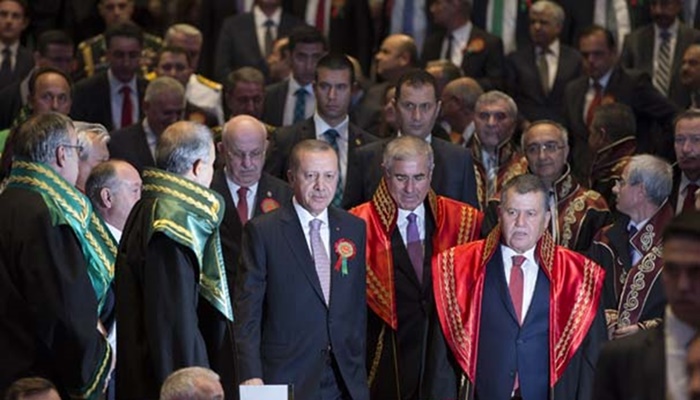The Istanbul Prosecutor’s Office announced on Saturday that investigations are under way in nine provinces including Istanbul into 1,004 judges and prosecutors and 68 governors and district governors over links to the Gülen movement, which is accused by the Turkish government of masterminding a failed coup attempt on July 15, DHA reported.
According to the statement, court cases have been launched for 162 of 1,004 judges and prosecutors, while investigations into the governors and district governors are continuing.
A total of 448 of the 1,004 judges and prosecutors are in jail, while 400 have been released on judicial probation. Fifty-seven judges and prosecutors are at large, and 99 were allowed to return to their job.
Justice Minister Bekir Bozdağ on Friday said more than 4,000 judges and prosecutors have been dismissed over links to the Gülen movement and that none of the remaining judges and prosecutors have been left uninvestigated.
According to the t24 news website, the government has dismissed 4,238 of Turkey’s 14,661 judges and prosecutors since July 15.
The government has been criticized for using the coup attempt as an excuse to purge judges and prosecutors and replace them with names close to the ruling Justice and Development Party (AKP) and President Recep Tayyip Erdoğan.
Main opposition Republican People’s Party (CHP) İstanbul deputy Barış Yarkadaş recently said the AKP government had recruited for the position of judge 800 lawyers who had ties to the party.
Justice Minister Bozdağ on Aug. 17 announced a government plan to name 8,000 new judges and prosecutors by the end of 2016.
On Dec 8, 2016, the European Networks of Councils for the Judiciary (ENCJ) suspended the observer status of Turkey’s Supreme Board of Judges and Prosecutors (HSYK) and excluded it from participation in ENCJ activities for the mass suspension and dismissal of judges and prosecutors and the failure to comply with the European Standards for Councils for the Judiciary.
Immediately after the failed coup attempt on July 15, the AKP government along with President Erdoğan pinned the blame on the Gülen movement.
Fethullah Gülen, who inspired the movement, strongly denied having any role in the failed coup and called for an international investigation into it, but President Erdoğan — calling the coup attempt “a gift from God” — and the government initiated a widespread purge aimed at cleansing sympathizers of the movement from within state institutions, dehumanizing its popular figures and putting them in custody.
According to a statement from Turkish Justice Minister Bekir Bozdağ on May 6, 149,833 people have been investigated and 48,636 have been jailed as part of an investigation targeting the Gülen movement since the July 15 coup attempt in Turkey.
Contrary to accusations made by President Erdoğan and the Turkish government, the Foreign Affairs Committee of the UK Parliament concluded in March that Gülen and the movement he inspired as a whole were not behind the failed coup in Turkey.
The UK Parliament statement came a week after Germany rejected Erdoğan and the Turkish government’s accusations against the Gülen movement about July 15.
The head of Germany’s Federal Intelligence Service (BND), Bruno Kahl, said Turkey could not convince them that US-based Turkish-Islamic scholar Gülen was behind the failed coup in July.
Similarly, Devin Nunes, chairman of United States House Permanent Select Committee on Intelligence, said he has not seen any evidence showing Gülen’s involvement in the putsch in Turkey.
In addition, a report prepared by the EU Intelligence Analysis Centre (IntCen) revealed that the coup attempt was staged by a range of Erdoğan’s opponents due to fears of an impending purge.
